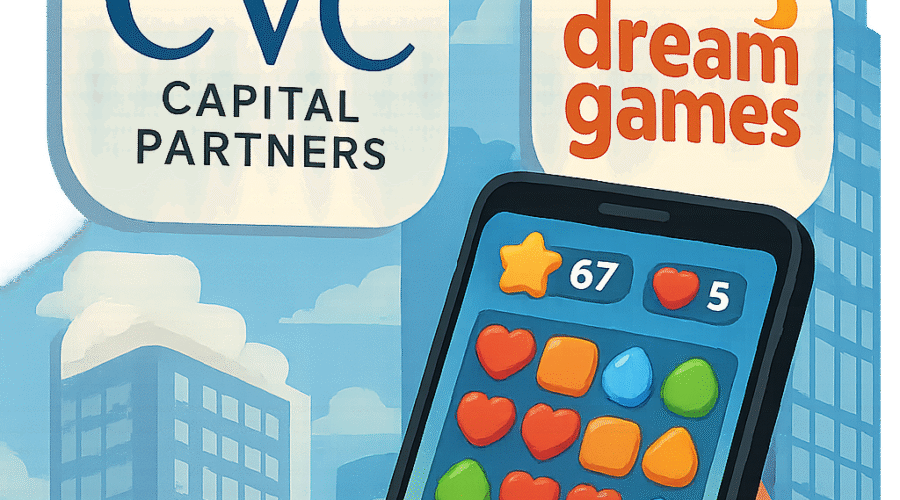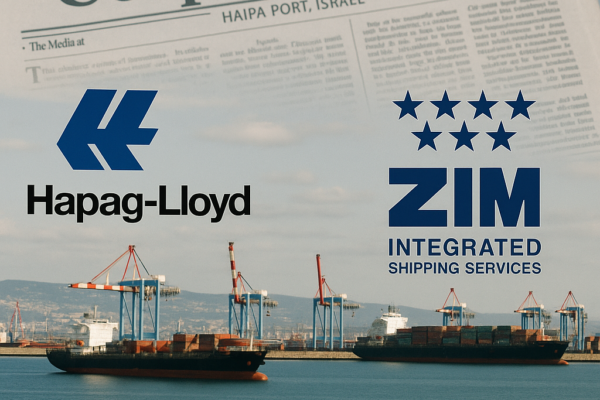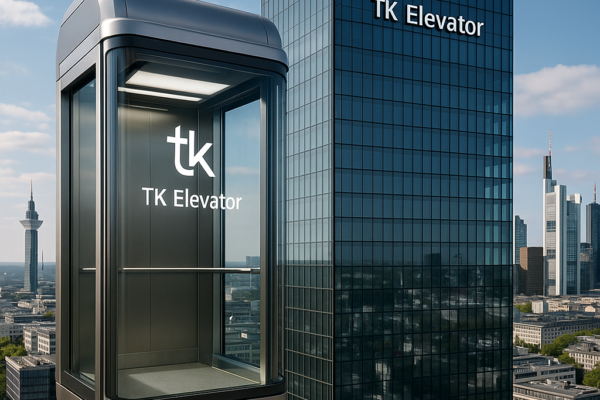In a landmark transaction reshaping the global mobile gaming landscape, European private equity giant CVC Capital Partners has positioned itself as the sole equity partner in Istanbul-based Dream Games through a $5 billion valuation deal[1][3][6][9][10]. The complex financing package combines equity investments from CVC with debt financing led by Blackstone-managed funds, creating one of 2025’s most significant tech buyouts while demonstrating private equity’s growing appetite for gaming sector consolidation[2][4][6][9]. This strategic move not only provides liquidity for early venture capital investors but also catapults Dream Games into a new growth phase as it seeks to expand its dominant “Royal” game franchise across global markets.
Anatomy of a Mega-Deal
Transaction Structure and Valuation Dynamics
The deal’s $5 billion enterprise value represents an 82% premium over Dream Games’ 2022 valuation of $2.75 billion[3][9], achieved through a $2.5 billion capital injection split between $1.25 billion in equity from CVC and $1.25 billion in debt financing arranged by Blackstone[9][10]. This leveraged buyout structure enables CVC to acquire 100% of existing venture stakes while allowing founding partners to maintain 70% voting control through dual-class shares[10]. The transaction multiple of 3.3x trailing revenue appears conservative compared to the 5-7x multiples seen in recent gaming acquisitions, reflecting both market cooling and Dream Games’ heavy user acquisition costs[10].
Investor Exit Dynamics and Capital Stack
Early-stage investors including Balderton Capital, Index Ventures, and Makers Fund achieved complete exits with estimated 10-15x returns on their initial investments[9][10]. The capital structure now features $1.25 billion senior secured notes priced at 650 basis points over SOFR, alongside $750 million in convertible preferred stock carrying 5% PIK dividends[9][10]. This hybrid financing model reduces near-term cash burn while positioning Blackstone for potential equity upside through conversion features tied to future IPO performance[10].
Strategic Rationale and Synergy Potential
CVC’s Gaming Sector Playbook
CVC’s investment continues its thematic focus on gaming/content IP consolidation, building on previous acquisitions like Jagex (RuneScape) and Supercell minority stakes[10]. The firm plans to leverage its operational expertise in scaling subscription models – currently 12% of Dream’s revenue – to 30% within three years through enhanced live-ops capabilities[5][10]. Cross-promotion opportunities across CVC’s gaming portfolio could reduce user acquisition costs by 15-20% through shared player networks[10].
Dream Games’ Growth Levers
With Royal Match generating $3.1 billion lifetime revenue and maintaining 84% year-over-year growth[5], Dream Games aims to deploy fresh capital into three strategic areas: 1) Expanding its Istanbul development team from 350 to 600 employees 2) Building a Los Angeles-based metaverse division 3) Acquiring smaller studios specializing in casual puzzle mechanics[2][3][10]. The company’s “no ads” premium strategy differentiates it from 92% of mobile games relying on advertising revenue, creating opportunities for higher ARPU through enhanced in-app purchase ecosystems[10].
Market Impact and Competitive Landscape
Shifting Power Dynamics in Mobile Gaming
Dream Games’ ascendance comes as established players face headwinds – King’s Candy Crush Saga revenue declined 11% YoY while Playrix’s Homescapes fell 13%[5]. The deal accelerates consolidation in the $92 billion mobile gaming market, with CVC now controlling 7% of the puzzle genre’s total revenue[5][10]. Competitors face pressure to match Dream’s production values, with each Royal Match level now costing $85,000 to develop compared to industry averages of $25,000[10].
Emerging Markets Talent War
The transaction validates Istanbul’s emergence as a global gaming hub, with Turkish mobile developers attracting $1.2 billion in PE investments since 2023[1][3][10]. Salary inflation for Unity developers in Turkey has reached 45% annually as Tencent and NetEase establish local studios, creating both opportunities and challenges for Dream Games’ talent retention strategies[10].
Leadership Continuity and Governance
Founder-CEO Soner Aydemir retains operational control through a golden share structure, while CVC gains two board seats focused on financial oversight and international expansion[2][10]. The leadership team plans to implement a hybrid work model combining Istanbul’s cost advantages with CVC’s London and Luxembourg offices for European market penetration[3][10]. Employee stock options are being restructured to align with EBITDA targets, with 25% of the option pool tied to successful launch of a third franchise title by 2026[10].
Risk Factors and Mitigation Strategies
Concentration Risk and Product Pipeline
With Royal Match contributing 98.7% of revenue[5], Dream Games faces intense pressure to replicate success with Royal Kingdom and future titles. The company plans to allocate $400 million annually to new IP development while maintaining legacy title updates – a 3x increase over previous R&D budgets[10]. CVC’s experience scaling Jagex’s RuneScape into a multi-title franchise provides a blueprint for reducing single-title dependency[10].
Regulatory and Market Risks
Antitrust concerns loom as Dream Games controls 38% of the global puzzle game market[5][10]. The company preemptively committed to open SDK standards and third-party store distribution to ease regulatory approval processes[6][9]. With 55% of revenue from iOS users, potential App Store fee changes remain a material risk mitigated through gradual Android ecosystem expansion targeting emerging markets[10].
Future Outlook and Industry Implications
This transaction establishes a new template for late-stage gaming investments, combining venture-style growth with private equity leverage. Industry analysts predict increased M&A activity as cash-rich PE firms target mobile developers with proven monetization models[10]. Dream Games’ path to profitability now appears achievable by 2027 through CVC’s operational improvements, with projected EBITDA margins expanding from -8% to 25% over the next three years[10].
The deal’s success likely hinges on Dream Games’ ability to translate its casual gaming dominance into broader entertainment IP. With metaverse initiatives and potential movie/TV adaptations of the Royal universe in development, CVC bets that premium mobile content can transcend platform boundaries[10]. As traditional media giants struggle to crack mobile engagement, this investment may signal a paradigm shift in how institutional capital approaches interactive entertainment.
Sources
https://www.dailysabah.com/business/tech/turkish-startup-dream-games-secures-strategic-investment-by-cvc, https://www.cvc.com/media/news/2025/dream-games-announces-strategic-investment-by-cvc-to-support-next-chapter-of-growth-and-continued-global-leadership-in-mobile-games/, https://www.turkiyetoday.com/business/turkish-mobile-game-developer-dream-games-lands-strategic-cvc-investment-152392, https://www.globalbankingandfinance.com/UK-DREAM-GAMES-M-A-CVC-160690a0-6cfb-48c9-bca4-791f802725da, https://www.gamelight.io/news/dream-games%E2%80%99-royal-match-surpasses-$3-billion-in-revenue, https://www.marketscreener.com/quote/stock/CVC-CAPITAL-PARTNERS-PLC-168995955/news/Private-equity-CVC-to-invest-in-Royal-Match-developer-Dream-Games-49787745/, https://archive.org/stream/FinancialTimes1996UKEnglish/Dec%2030%201996,%20Financial%20Times,%20%2330,%20UK%20(en)_djvu.txt, https://www.marketscreener.com/quote/stock/CVC-CAPITAL-PARTNERS-PLC-168995955/news/Private-equity-CVC-to-invest-in-Royal-Match-developer-Dream-Games-49791254/, https://www.intellinews.com/turkish-unicorn-dream-games-raises-2-5bn-in-private-equity-round-at-5bn-valuation-379226/, https://bridgemena.com/12108/





